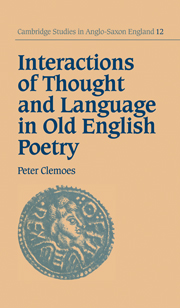Book contents
- Frontmatter
- Contents
- Illustrations
- Preface
- Abbreviations
- PART I The poetry of an aristocratic warrior society
- PART II The poetry of a universal religion
- 7 Vernacular poetic narrative in a Christian world
- 8 Poet, public petitioner and preacher
- 9 Symbolic language serving the company of Christ
- 10 Adaptation to a new material morality
- 11 From social hero to individual sub specie aeternitatis
- 12 Loyalty as a responsibility of the individual
- 13 This world as part of God's spiritual dominion
- Works cited
- Index I Quotations of two or more ‘lines’ of Old English poetry
- Index II A representative selection of the symbols and word pairs cited in discussion
- Index III General
13 - This world as part of God's spiritual dominion
Published online by Cambridge University Press: 18 December 2009
- Frontmatter
- Contents
- Illustrations
- Preface
- Abbreviations
- PART I The poetry of an aristocratic warrior society
- PART II The poetry of a universal religion
- 7 Vernacular poetic narrative in a Christian world
- 8 Poet, public petitioner and preacher
- 9 Symbolic language serving the company of Christ
- 10 Adaptation to a new material morality
- 11 From social hero to individual sub specie aeternitatis
- 12 Loyalty as a responsibility of the individual
- 13 This world as part of God's spiritual dominion
- Works cited
- Index I Quotations of two or more ‘lines’ of Old English poetry
- Index II A representative selection of the symbols and word pairs cited in discussion
- Index III General
Summary
Old English poets, traditionally used to treating secular authority, based their system for this world's workings of the divine spirit on a conception of God as the supreme ruler of both heaven and earth. Epithets acknowledging this lordship form by far the largest category of their appellations of the deity, and the items in this ‘ruler’ group which they used especially often were for the most part adaptations of existing secular social terms. The ‘kingship’ nouns, which, as self-standing simplexes or as components of compounds or of genitive or adjective combinations, denote God nearly, or over, fifty times apiece, bear this out: dryhten 1038 × (almost as frequent as god), cyning 305 ×, waldend (hardly occurring in any other designation) 272 × (cf. alwalda 23 × and anwalda 5 ×), frea 112 ×, weard 93 ×, þeoden 87 ×, ealdor 59 × and ælmihtig(a) (noun) 49 × (also with twice this frequency as an adjective). But God's authority was by no means identical to its worldly counterpart. His power, at the heart of an infinite spiritual domain embracing all eternity, emanated from beyond temporal existence. This world's blend of the spiritual and the material was dependent on a purely spiritual external might. Mankind's subordination to its spiritual overlord was partly familiar from traditional social situations and partly sui generis.
- Type
- Chapter
- Information
- Interactions of Thought and Language in Old English Poetry , pp. 438 - 487Publisher: Cambridge University PressPrint publication year: 1995

